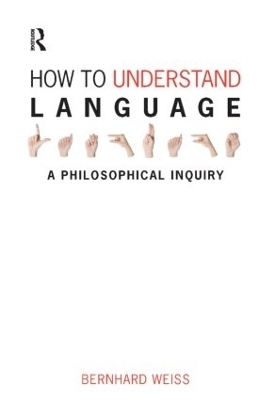
How to Understand Language
A Philosophical Inquiry
Seiten
2009
Acumen Publishing Ltd (Verlag)
978-1-84465-197-9 (ISBN)
Acumen Publishing Ltd (Verlag)
978-1-84465-197-9 (ISBN)
Why are philosophers, as opposed to, say, linguists and psychologists, puzzled by language? How should we attempt to shed philosophical light on the phenomenon of language? This title answers these two questions.
Why are philosophers, as opposed to, say, linguists and psychologists, puzzled by language? How should we attempt to shed philosophical light on the phenomenon of language? "How to Understand Language" frames its discussion by these two questions. The book begins by thinking about the reasons that language is hard to understand from a philosophical point of view and, armed with the fruits of that discussion, begins searching for an approach to these questions. After finding fault with approaches based on philosophical analysis and on translation it undertakes an extended investigation of the programme of constructing a theory of meaning. Donald Davidson's advocacy of that approach becomes pivotal; though, the book endorses his broad approach, it argues strongly against the roles both of truth theory and of radical interpretation.
Why are philosophers, as opposed to, say, linguists and psychologists, puzzled by language? How should we attempt to shed philosophical light on the phenomenon of language? "How to Understand Language" frames its discussion by these two questions. The book begins by thinking about the reasons that language is hard to understand from a philosophical point of view and, armed with the fruits of that discussion, begins searching for an approach to these questions. After finding fault with approaches based on philosophical analysis and on translation it undertakes an extended investigation of the programme of constructing a theory of meaning. Donald Davidson's advocacy of that approach becomes pivotal; though, the book endorses his broad approach, it argues strongly against the roles both of truth theory and of radical interpretation.
Bernhard Weiss is Associate Professor of Philosophy at University of Cape Town, South Africa.
Preface 1. The Puzzles of Language 2. The Starting Point for Analysis 3. Analysing Sentence Meaning 4. Analysing Synonymy 5. Radical Translation 6. The Structure of a Theory of Meaning 7. Radical Interpretation 8. Linguistic Norms, Communication and Radical Interpretation 9. Linguistic Normativity 10. Radical or Robust? 11. Language and Community 12. Rules and Privacy: The Problem 13. Rules and Privacy: The Solution? 14. Truth-conditions vs Use-conditions Notes Bibliography Index
| Erscheint lt. Verlag | 1.10.2009 |
|---|---|
| Verlagsort | Durham |
| Sprache | englisch |
| Maße | 156 x 234 mm |
| Gewicht | 453 g |
| Themenwelt | Geisteswissenschaften ► Philosophie ► Sprachphilosophie |
| ISBN-10 | 1-84465-197-5 / 1844651975 |
| ISBN-13 | 978-1-84465-197-9 / 9781844651979 |
| Zustand | Neuware |
| Haben Sie eine Frage zum Produkt? |
Mehr entdecken
aus dem Bereich
aus dem Bereich
Macht und Legitimität politischer Sprache im Prozess der europäischen …
Buch | Softcover (2023)
Nomos (Verlag)
74,00 €
KI, Kreativität und algorithmische Postrationalität
Buch | Softcover (2024)
Matthes & Seitz Berlin (Verlag)
16,00 €
Wie die Menschheit zu ihrer größten Erfindung kam
Buch | Softcover (2022)
C.H.Beck (Verlag)
18,00 €


